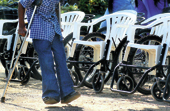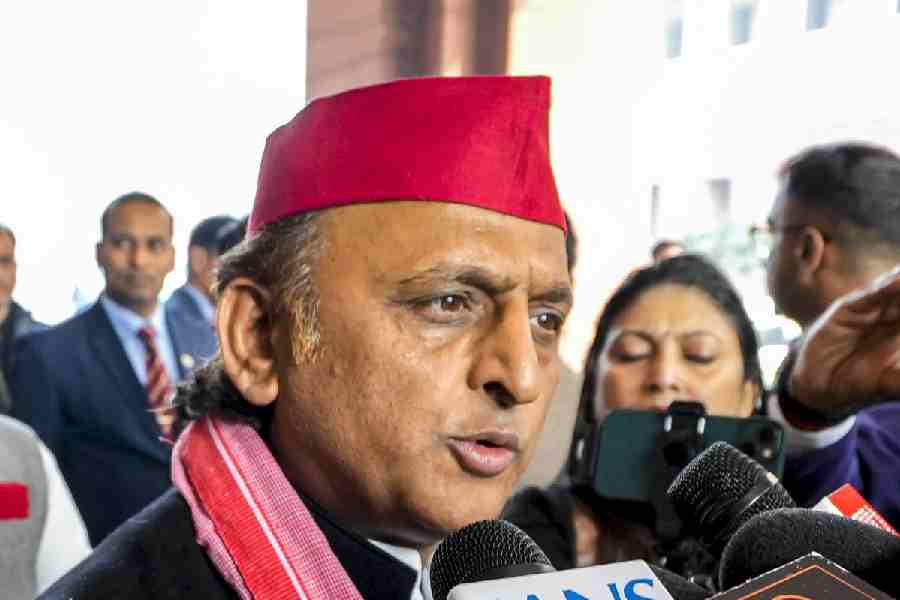 |
| Discomfort level: There are very few civic amenities for the handicapped (Photo: AFP) |
Browsing through books ? and spending a bomb on them ? was a passion for Arindam Mitra, a corporate executive working in Ahmedabad. And after a freak accident six years ago confined him to a wheelchair, he had even more need for his jacketed friends. But the accident had also spelt the end of his love affair with bookshops. There was no way he could access the stores on his wheelchair as they had no ramps or doors wide enough. Mortified, he called up the manager of his favourite bookstore to plead the case of disabled customers. ?Koi baat nahin?aap chale aaiye. Aapko hum uthakar andar le ayenge,? replied the manager. ?That was the most humiliating line I?ve heard in my life. Am I a sack of potatoes, I asked myself. Why shouldn?t I be treated with dignity? do I have no rights as a customer?? asks Mitra.
With the International Day for Disabled Persons barely a week past, it?s the kind of question many people are asking. ?It is quite amazing that our civic authorities or the private sector has not woken up to the problems that the physically handicapped face everyday,? complains Sabarni Bagchi, mother of 13-year-old Titir who is suffering from spina bifida, a musculo-skeletal disorder. ?I can?t move around with my son. He can?t enter movie halls, shopping centres or ice cream parlours? there?s just no provision for him,? iterates Bagchi.
?Leave alone theatres or malls, even our trains do not have any facilities for us. I haven?t been able to visit my folks in Calcutta since my accident,? adds Mitra. ?The train compartments are not suited to accommodate someone on a wheelchair and I can?t always afford to fly. Hence, I don?t travel,? he says.
And while some have come to terms with the general apathy, others are fighting tooth and nail to establish the rights of the disabled as consumers. Mitra, for example, has taken up the cause as his mission in life. He?s now part of Access Resource Group, a body that works to promote barrier-free structures. ?We started our journey from Ahmedabad?s Law Garden, one of the city?s popular spots. We held a public meeting there in March 2003. People from various fields ? from welfare activism to the service industry to the media ? attended it. There, we discussed the issue of accessibility. Since then, we have been auditing building plans and even existing structures to make them more accessible,? explains Mitra. The group is now all set to bring out manuals to promote awareness on this issue.
?The truth is that there are legal provisions to make things easier for people with mobility problems. But no one seems to give a damn,? comments Prabir Basu, an advocate and working president of the Bengal Federation of Consumers? Organisations. ?The Parliament passed the PWD (Persons With Disabilities) Act in January 1996 in which it enumerates equal facilities for the disabled in rail compartments, buses, aircraft, etc. But implementation is nil,? says Basu.
?I am told there are ground rules for even traffic signals to help the disabled use the crossings. Even pavements are supposed to have slopes and special ramps in both government and private buildings. But I don?t see even one. Also, the elevator buttons and ATM keyboards are too high for a person on a wheelchair to reach,? observes 44-year-old Arjya Sengupta, a Calcutta-based writer, whose daughter is a patient of cerebral palsy, another crippling disorder.
While some attribute the problem to apathy, others think ?it?s a lack of awareness? that has left many loose ends. For example, how many of us know that every luxury hotel has to have at least two rooms for disabled guests? Interestingly, a survey conducted in November 2003 revealed that most Delhi hotels do not meet the requirement. ?We were checking the facilities for participants at Abilympics, an international vocational meet for the disabled. The findings were most disappointing, if not shocking. We were faced with a serious accommodation problem,? recounts Anjali Agarwal, member of Delhi-based Samarthya, a welfare body that runs workshops on barrier-free structures. Crippled by muscular dystrophy herself, Agarwal ? along with colleague Sanjeev Sachdeva (also a wheelchair-user) ? is now actively promoting the rights of the disabled in the tourism sector and related areas. Their latest achievement is the renovation of Dilli Haat ? a heritage centre ? to suit the needs of the disabled. ?The last phase of renovation is in progress. There are ramps, user-friendly toilets, etc. We are also negotiating with the ministry of tourism to make all youth hostels barrier-free,? informs Agarwal.
Clearly, this is just the beginning and a small one at that. ?What stakeholders don?t realise is that the disabled are consumers? that?s because we always fall in their blind spot. But if they calculate how much of the market they are losing out on, I?m sure their attitudes will change,? concludes Mitra.
The rulebook says…
 |
The PWD (Persons with Disabilties) Act 1995 makes the following provisions:
![]() … that rail compartments, buses, vessels and aircraft have to be designed to permit easy access to people with disabilities
… that rail compartments, buses, vessels and aircraft have to be designed to permit easy access to people with disabilities
![]() … that hospitals, primary health centres and other medical care and rehabilitation institutions should have ramps
… that hospitals, primary health centres and other medical care and rehabilitation institutions should have ramps
![]() … auditory signals have to be installed at red lights on public roads for the visually handicapped
… auditory signals have to be installed at red lights on public roads for the visually handicapped
![]() … toilets and waiting rooms at stations and airports have to be specially designed in order to meet the needs of wheelchair-users
… toilets and waiting rooms at stations and airports have to be specially designed in order to meet the needs of wheelchair-users










